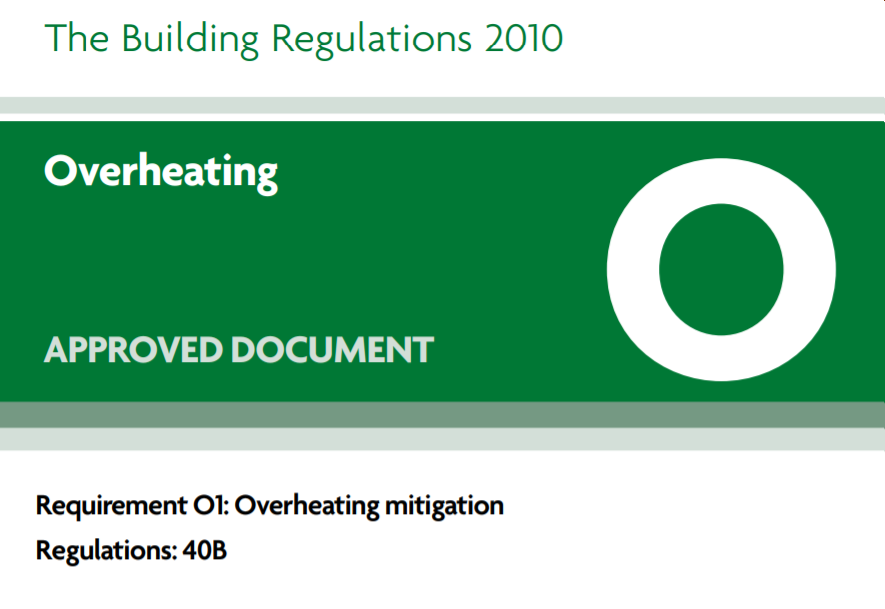Changes to approved document L and F and new approved document O
On 15 December 2021 the government announced changes to the building regulations to help the UK deliver net zero. This includes a requirement for new homes to produce around 30% less CO2 than current standards, and a 27% reduction in emissions from other new buildings.
All new residential buildings, including homes, care homes, student accommodation and children’s homes, must also be designed to reduce overheating. Improvements to ventilation are also being introduced to support the safety of residents in newly-built homes and to prevent the spread of airborne viruses in new non-residential buildings.
The changes follow a public consultation and will come into effect from 15 June 2022, paving the way for the Future Homes and Buildings Standard in 2025, which will mean all future homes are net zero ready and will not need retrofitting.
Alongside amendments to the Building Regulations, 5 new Approved Documents were published:
- Approved Document L, volume 1: dwellings
- Approved Document L, volume 2: buildings other than dwellings
- Approved Document F, volume 1: dwellings
- Approved Document F, volume 2: buildings other than dwellings
- Approved Document O covering overheating
Transitional arrangements are in place which mean that if a building notice, initial notice, or full plans for building work are submitted to a local authority before 15 June 2022, then provided the building work commences by 15 June 2023, work on that building can continue under the previous standards.
Housing Minister Eddie Hughes said: “The changes will significantly improve the energy efficiency of the buildings where we live, work and spend our free time and are an important step on our country’s journey towards a cleaner, greener built environment.”
Ref https://www.gov.uk/government/news/new-homes-to-produce-nearly-a-third-less-carbon
[edit] Related articles on Designing Buildings
- 15 June 2022 changes to Approved Documents.
- Approved Document O.
- Approved documents.
- Approved inspector.
- Building control bodies.
- Building Regulations exemptions.
- Building Regulations.
- Competent person schemes.
- Licensing.
- Planning permission.
- Statutory approvals.
- Statutory authorities.
- The Building Act.
Featured articles and news
What they are, how they work and why they are popular in many countries.
Plastic, recycling and its symbol
Student competition winning, M.C.Esher inspired Möbius strip design symbolising continuity within a finite entity.
Do you take the lead in a circular construction economy?
Help us develop and expand this wiki as a resource for academia and industry alike.
Warm Homes Plan Workforce Taskforce
Risks of undermining UK’s energy transition due to lack of electrotechnical industry representation, says ECA.
Cost Optimal Domestic Electrification CODE
Modelling retrofits only on costs that directly impact the consumer: upfront cost of equipment, energy costs and maintenance costs.
The Warm Homes Plan details released
What's new and what is not, with industry reactions.
Could AI and VR cause an increase the value of heritage?
The Orange book: 2026 Amendment 4 to BS 7671:2018
ECA welcomes IET and BSI content sign off.
How neural technologies could transform the design future
Enhancing legacy parametric engines, offering novel ways to explore solutions and generate geometry.
Key AI related terms to be aware of
With explanations from the UK government and other bodies.
From QS to further education teacher
Applying real world skills with the next generation.
A guide on how children can use LEGO to mirror real engineering processes.
Data infrastructure for next-generation materials science
Research Data Express to automate data processing and create AI-ready datasets for materials research.
Wired for the Future with ECA; powering skills and progress
ECA South Wales Business Day 2025, a day to remember.
AI for the conservation professional
A level of sophistication previously reserved for science fiction.
Biomass harvested in cycles of less than ten years.
An interview with the new CIAT President
Usman Yaqub BSc (Hons) PCIAT MFPWS.
Cost benefit model report of building safety regime in Wales
Proposed policy option costs for design and construction stage of the new building safety regime in Wales.
Do you receive our free biweekly newsletter?
If not you can sign up to receive it in your mailbox here.

























